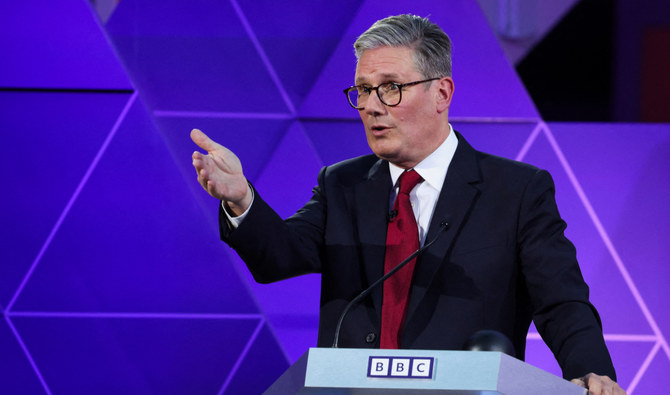LONDON: UK Labour leader Keir Starmer is an ex-human rights lawyer and public prosecutor who will have to focus his relentless work ethic and methodical mind to fixing the country.
If exit polls are confirmed, at 61, Starmer will be the oldest person to become British prime minister in almost half a century — and comes just nine years since he was first elected to parliament.
The married father-of-two is unlike most modern politicians: he had a long and distinguished career before becoming an MP and his views are rooted in pragmatism rather than ideology.
“We must return politics to service,” Starmer said repeatedly during the campaign, promising to put “country first, party second” following 14 chaotic years of Conservative rule under five different prime ministers.
That mantra chimes with supporters’ lauding of him as a managerial safe pair of hands who will approach life in Downing Street the same way he did his legal career: seriously and forensically.
Detractors, though, label him an uninspiring opportunist who regularly shifts position on an issue and who has failed to spell out a clear and defining vision for the country.
Football-mad Starmer, a devoted Arsenal fan, has struggled to shed his public image as buttoned-up and boring and only recently started to appear more at ease in the public spotlight.
Supporters admit that he fails to ooze the charisma of more flashy predecessors like Boris Johnson, but say that therein lies his appeal: a reassuring and strait-laced presence following the turbulent, self-serving years of Tory rule.
With his grey quiff and black-rimmed glasses — Starmer, named after Labour’s founding father Keir Hardie — is also the center-left party’s most working-class leader in decades.
“My dad was a toolmaker, my mum was a nurse,” he tells voters often, countering depictions by opponents that he is the epitome of a smug, liberal, London elite.
Starmer’s purging of left-wingers from his party highlights a ruthless side that has propelled him to Britain’s highest political office, but he is said to be funny in private and loyal to his friends.
He has pledged to maintain his habit of not working after 6:00 p.m. on a Friday to spend time with his wife Victoria, who works as an occupational therapist in the National Health Service, and their two teenage children, who he does not name in public.
“There’s something extraordinary in him still being quite normal,” Starmer’s biographer Tom Baldwin wrote in the Guardian.
Born on September 2, 1962, Keir Rodney Starmer was raised in a cramped, pebbledashed semi-detached house on the outskirts of London by a seriously ill mother and an emotionally distant father.
He had three siblings, one of whom had learning difficulties. His parents were animal lovers who rescued donkeys.
A talented musician, Starmer had violin lessons at school with Norman Cook, the former Housemartins bassist who became DJ Fatboy Slim.
After legal studies at the universities of Leeds and Oxford, Starmer turned his attention to leftist causes, defending trade unions, anti-McDonald’s activists and death row inmates abroad.
He is friends with human rights lawyer Amal Clooney from their time together at the same legal practice and once recounted a boozy lunch he had with her and her Hollywood actor husband George.
In 2003, he began moving toward the establishment, shocking colleagues and friends, first with a job ensuring police in Northern Ireland complied with human rights legislation.
Five years later, he was appointed director of public prosecutions (DPP) for England and Wales when Labour’s Gordon Brown was prime minister.
Between 2008 and 2013, he oversaw the prosecution of MPs for abusing their expenses, journalists for phone-hacking, and young rioters involved in unrest across England.
He was knighted by Queen Elizabeth II, but rarely uses the prefix “Sir,” and in 2015 was elected as a member of parliament, representing a seat in left-leaning north London.
Just weeks before he was elected, his mother died of a rare disease of the joints that had left her unable to walk for many years.
Just a year after becoming an MP, Starmer joined a rebellion by Labour lawmakers over radical left-winger Jeremy Corbyn’s perceived lack of leadership during the EU referendum campaign.
It failed, and later that year he rejoined the top team as Labour’s Brexit spokesman, where he remained until succeeding Corbyn after he took the party to its worst defeat since 1935 in the last election five years ago.
Starmer moved the party back to the more electable center ground, purging Corbyn and rooting out anti-Semitism.
Dominic Grieve, who as Conservative attorney-general worked closely with Starmer as DPP, said he “inspires loyalty because he comes across as being so transparently decent and rational.”
“These are quite important features even if you disagree with a policy. And he comes across as man of moderation,” he told The Times.
Nevertheless, the left accuses him of betrayal for dropping a number of pledges he made during his successful leadership campaign, including the scrapping of university tuition fees.
But his successful strategic repositioning of Labour is indicative of a constant throughout his life: a drive to succeed.
“If you’re born without privilege, you don’t have time for messing around,” Starmer once said.
“You don’t walk around problems without fixing them, and you don’t surrender to the instincts of organizations that won’t face up to change.”


























